Alan Bennett’s Talking Heads – A Review of the Original Monologues
With the remake now airing in Britain, it's time to revisit the originals....
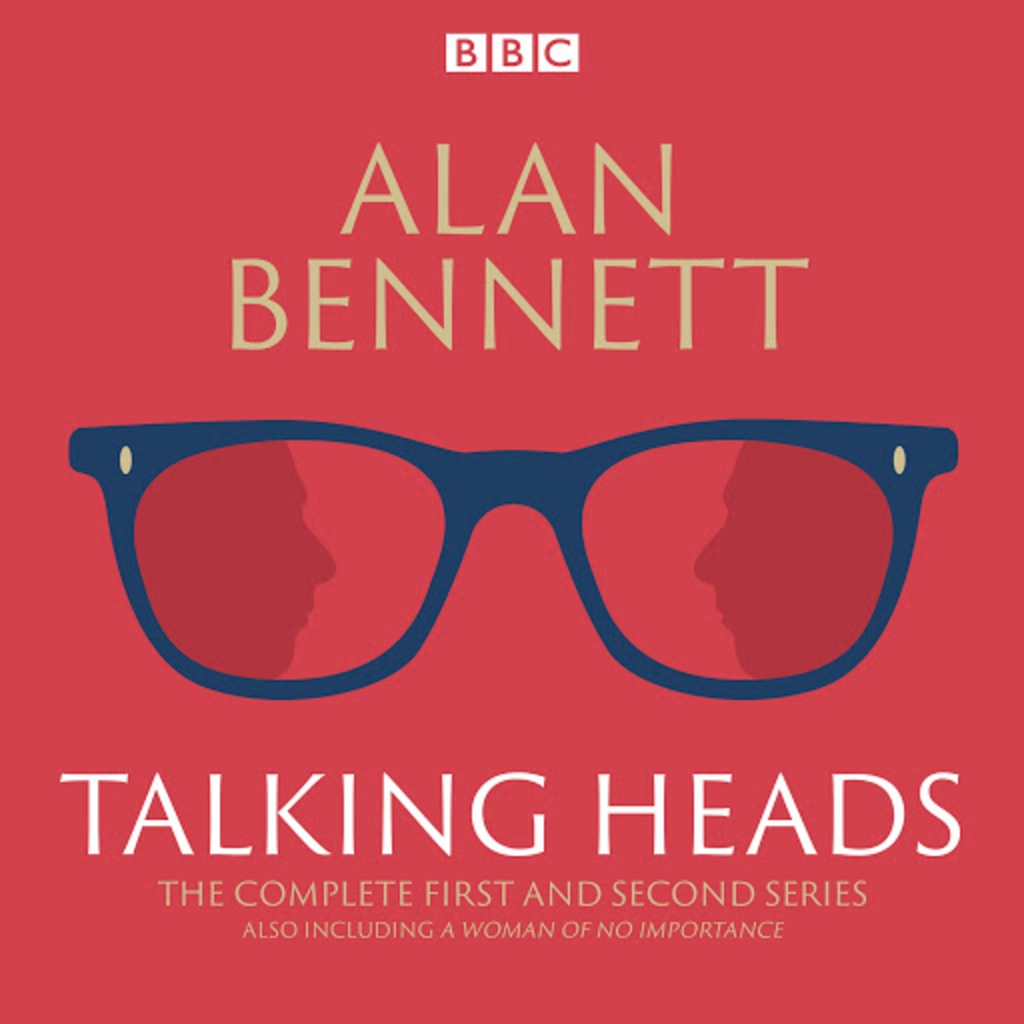
The COVID-19 pandemic has caused most of Britain’s TV shows to suspend shooting for months, but provided opportunities for smaller, more intimate entertainment which can be made under social distancing restrictions. One of the most notable TV series to be created in this new climate is a remake of Alan Bennett’s TV series Talking Heads, which began airing this week. The original Talking Heads consisted of a set of monologues between 30 and 50 minutes long – the first series of six monologues aired in 1987, and a second aired in 1998. They have been remade with an all-star cast including Jodie Comer, Imelda Staunton, Martin Freeman and Tamsin Greig. These monologues were shot on vacated EastEnders sets, with cast and crew sticking carefully to social distancing regulations. Of the twelve original monologues, ten will air – “A Cream Cracker Under the Settee” and “Waiting for the Telegram” (which both starred Thora Hird as elderly women facing up to their impending deaths) are not included, due to the touchy subject matter and the creative team being unable to use cast members over 70. However, the gap has been filled by two new monologues called “The Shrine” and “An Ordinary Woman”, which were written by Bennett last year.
The Talking Heads remake has provided an excellent opportunity to revisit the originals. Some are better than others, but all of them are worth watching. It is not surprising that they have been staples of English and Drama education for decades.
(Note: The following reviews contain spoilers)
Series 1
"A Chip in the Sugar" (Starring Alan Bennett as Graham)
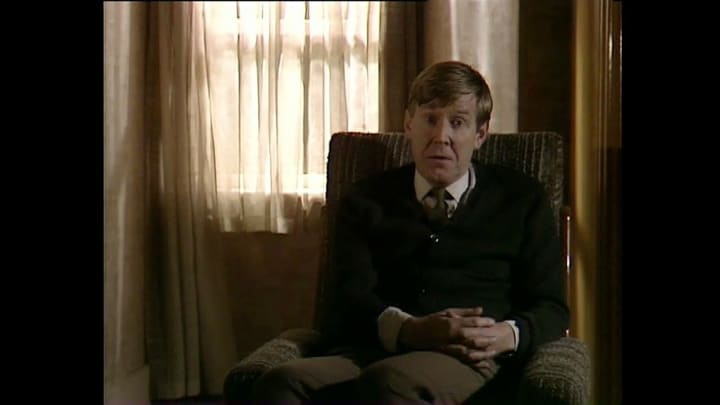
Plot: A middle-aged man finds his close relationship with his mother under threat when she begins dating an old friend.
This was the first monologue to air, in no small part because Alan Bennett himself plays the lead role. His surprisingly sinister performance is probably the highlight, but the monologue itself is unremarkable compared to some of the later ones. The contrast between the middle-class liberal Graham and the brash, right-wing Mr Turnbull drives the conflict, especially as his mother Mrs Whittaker turns from parroting Graham’s views to supporting Mr Turnbull’s. Despite his objectionable politics, Turnbull possesses a certain energy, and it is not hard to see why Mrs. Whittaker falls under his spell. Graham’s emotionally repressed, anxious personality is not suited to this sort of battle, and his repeated use of the phrase “I didn’t say anything” highlights his unease with the new arrangement. However, the episode concludes with Graham taking advantage of an eerily convenient revelation which allows him to get rid of Mr Turnbull, regardless of the damage it will do to Mrs. Whittaker’s newfound happiness. The camerawork is strong, with low shots and a closing close-up of Graham adding to the menacing note in Bennet’s performance. “A Chip in the Sugar” is a rather cold story, but its twisted take on mother-son dynamics is certainly interesting.
"A Lady of Letters" (Starring Patricia Routledge as Miss Irene Ruddock)
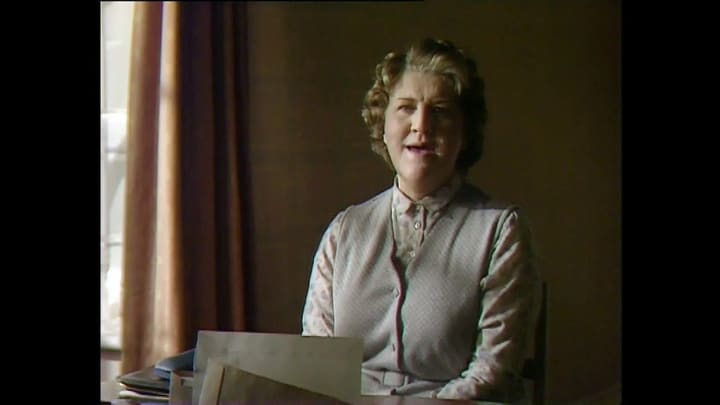
Plot: A woman obsessed with writing letters attracts police attention after spreading false rumours about her neighbors.
The prolific actress Patricia Routledge had worked with Bennett on his 1982 television monologue “A Woman of No Importance”, which was essentially a prototype for Talking Heads. This meant that it was no surprise to see her in the first series of Talking Heads. Fortunately, “A Lady of Letters” is an excellent showcase for her acting abilities.
The directors take a pleasingly cinematic approach, with close-ups of Miss Ruddock’s stationary and her suspicious looks at the neighbors next door. The first half is mostly comedic, as Ruddock complains about unsatisfactory funerals, badly prepared sausages, and policemen with glasses, but when the damage caused by Ms. Ruddock’s gossip becomes clear, the tone becomes more tragic. The shifts in mood are handled well, with the growing flashes of darkness adding depth to Ms. Ruddock despite her objectionable behavior. A late comment about her dislike of formulaic novels leads to a surprisingly potent observation about her inability to improve her situation (“This is it. This has been my go”). “A Lady of Letters” blends satirical mockery of busybodies with tragic commentary on the destructive effects of loneliness, and this odd combination means that Miss Ruddock ends up being one of the best-written characters in the entire collection. It is fitting that Ruddock’s downfall leads to some unexpected new opportunities, generating probably the happiest ending in the entire series.
"Bed Among the Lentils" (Starring Maggie Smith as Susan)
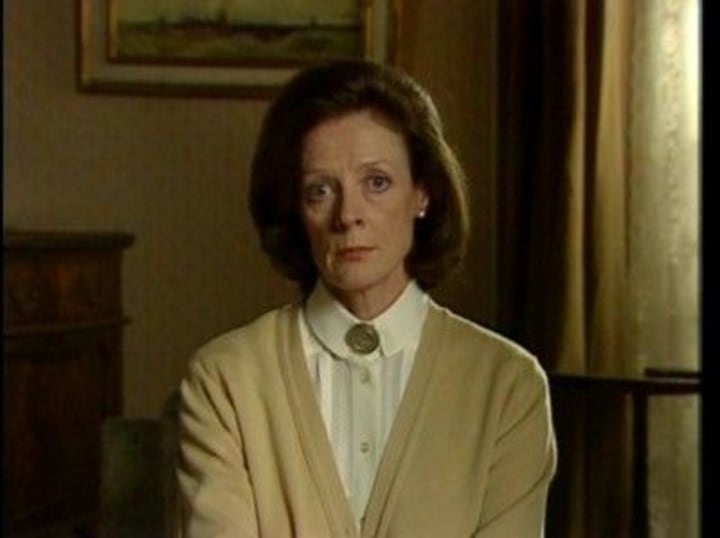
Plot: A vicar's wife strikes up an extra-marital relationship with a corner shop owner whilst coming to terms with her alcohol addiction.
At 48 minutes long, “Bed Among the Lentils”. is the longest of the monologues in the Talking Heads collection. This can make it feel somewhat padded, but it still has plenty of great moments. Susan’s sardonic tone gives the story a pleasingly bitter vein of comedy, as she comments on her well-meaning but clueless husband and his elderly “fan club”. Though it is one of the weaker monologues overall, “Bed Among the Lentils” has one of the best narrators, with Maggie Smith being as enjoyably acidic as ever.
The subplot of the story concerts Susan engaging in an extramarital affair with a young Indian shopkeeper. Talking Heads is generally set in a very white world, and many of the narrators are rather disdainful towards the non-white characters they interact with, but Susan’s relationship with Mr. Ramesh provides something of a counterpoint. However, it is a little underused in comparison to the depictions of the tedious banality of church life – Susan’s accounts of the embarrassment caused by her alcoholism are the most compelling aspect of the story. The two subplots dovetail effectively at the end, as the shopkeeper Ramesh leaves, but not before helping Susan come to terms with her problems. However, this merely leads to a return to the tedium of church life, with additional AA meetings. Susan observes with her usual dryness, stating “I never liked going to one church, so I end up going to two. Geoffrey would call that the wonderful mystery of God. I call it bad taste.”
"Soldiering On" (Starring Stephanie Cole as Muriel)
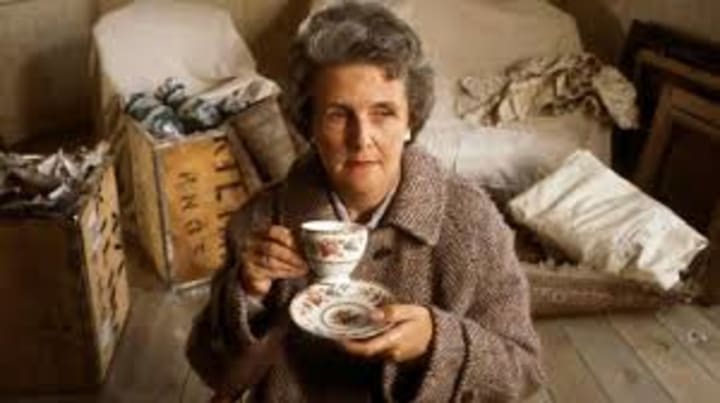
Plot: A woman tries to "soldier on" after the death of her husband, but an exploitative son and some disturbing secrets shatter her seemingly stable life.
“I wouldn’t want you to think this was a tragic story” Muriel says at the end of “Soldiering On”, “I’m Not a tragic woman, I’m not that type.” However, her focus on staying positive means her descent into destitution hits all the harder. The posh world Muriel inhabits is observed excellently, from the lavish funerals to the charity collectors swarming the house, but when she ignores advice to avoid big decisions, she finds herself stuck in a cheap Hunstanton flatlet with only a TV and cassette player for company. Muriel is the only Talking Heads narrator whose children play a major role in the story, but this turns out to be a huge problem for her, as her troubled daughter Margret has to be moved to an overcrowded public health facility and her son Giles turns out to be a total rotter. The climax features Muriel learning about the cause of Margret’s mental issues, but the taboo topic is handled with care and subtlety, and Margret’s ability at moving on provides a much-needed redemptive note. Stephanie Cole is somewhat overshadowed by the bigger stars in the surrounding monologues, but she does a fine job with her role.
"Her Big Chance" (Starring Julie Walters as Lesley)
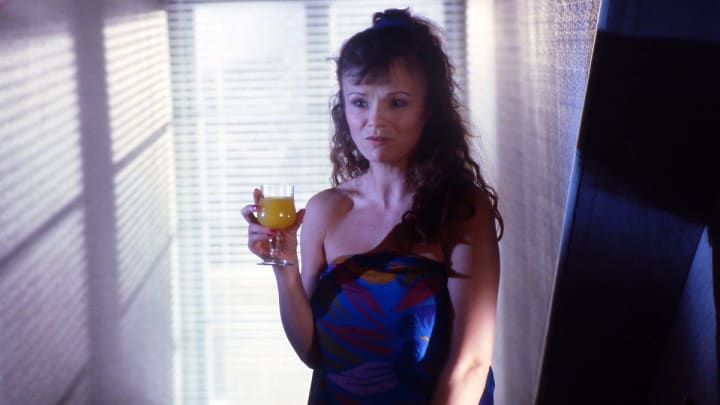
Plot: A delusional actress gains a role in an exploitation film, believing it could lead to something bigger.
“Her Big Chance” possesses one of the most impressive openings in the series. Lesley begins in sunglasses, reflected in a mirror above her bed, as she reveals she shot a man with a harpoon gun, but the camera moves away from the reflection and towards her as she moves into a series of “life-changing moments” platitudes about the deed before revealing her profession and talking about her experiences working on the soap Crossroads. This neatly sums up the gap between Lesley’s big ambitions and the less impressive reality. Lesley is a minor actress who overanalyses her walk-on roles, and when she ends up in a low-grade erotic thriller, she tries to bring entirely unnecessary depth to her “bimbo” character. Although several of the other monologues feature an element of “Cringe comedy” it dominates this story, as Lesley’s foolishness and social ineptitude (“you look like an interesting person. I’m interested in interesting people”) play a major part in her career struggles. Despite her faults as an actress and person, Lesley is quite an engaging narrator, in no small part due to Julie Walters’ talent and charisma.
“Her Big Chance” is the episode most rooted in its time and place, but also the one with the most topical resonance. With a deliberately retro “smooth jazz” score and flashy scene transitions, it embraces the kitsch of the late 1980s thoroughly. However, the depiction of a beautiful but guileless woman being exploited by male directors and crew members has gained a disturbing new resonance in the aftermath of the #MeToo revelations from late 2017 onwards. Lesley repeatedly gushes about her experiences working as an extra on the Roman Polanski film Tess, which was one of the first he made after being found guilty of child rape and fleeing the USA. The further abuse allegations against Polanski in recent years have enhanced the uncomfortable undertones of this running gag, highlighting Lesley’s complete obliviousness towards the dark side of the movie industry. This creepy subtext adds a layer of darkness, to the story, but this makes it a lot easier to relate to Lesley, making her more than the foolish bore she appears to be.
"A Cream Cracker Under the Settee" (Starring Thora Hird as Doris)
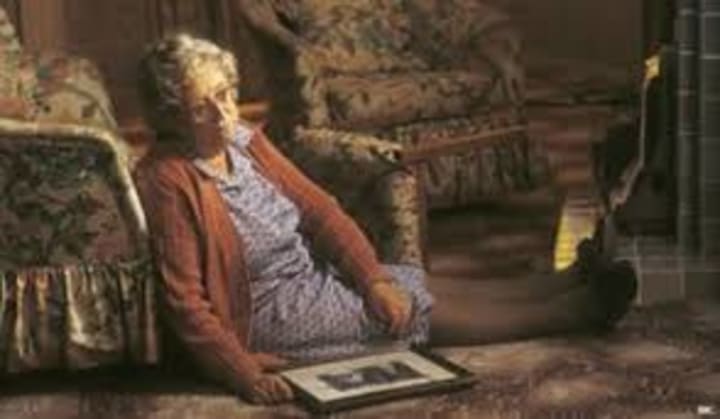
Plot: An elderly lady injures herself cleaning her house and reflects on her husband and her obsession with cleanliness.
Four of the Talking Heads monologues were nominated for BAFTAS (“Soldering On” and “Her Big Chance” were the ones that missed out), but it was A Cream Cracker Under The Settee which won, and it is not hard to see why. The creeping shadow of impending death gives the tale a dramatic edge which allows it to stand out. Hird gives an excellent performance, with her naturally grandmotherly persona edged with sadness and resentment. One of the major themes of the show is older characters feeling out of place in the modern world, and “A Cream Cracker Under the Settee” is one of the clearest examples of this. Doris’ obsession with cleanliness is rooted in a nostalgia for the old ways, which also expresses itself in her disdain for her carer Zumela. This is contrasted with her affection for her deceased husband, the more impulsive Wilfred, who created prams for a baby which ended up stillborn. Doris is one of the most self-aware characters in the series, which adds to the tragedy of her plight and gives a near-heroic dimension to her decision to accept her fate. Her ending speech (“They don’t get called Doris now. They don’t get called Wilfred. Museum names like that”) powerfully sums up the tragedy of a woman recognising that she is considered obsolete by the fast-moving world around her.
“A Cream Cracker Under the Settee” is the only Talking Heads monologue to feature a second character. An unnamed policeman is heard asking Doris what is happening to her. As Doris has made up her mind to avoid help and let her injuries take her, she quickly dismisses him. This fact is incidental to the story, but it does highlight that “A Cream Cracker Under the Settee” is one of the most remarkable stories in the Talking Heads collection.
Series 2
"Miss Fozzard Finds Her Feet" (Starring Patricia Routledge as Miss Fozzard)
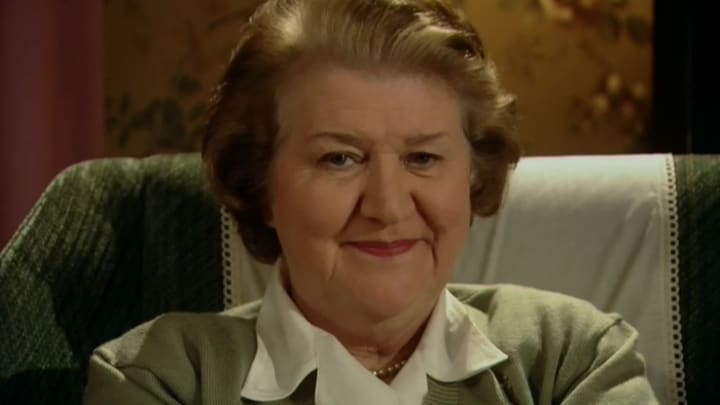
Plot: A department store worker ends up in a very odd relationship with her chiropodist.
Three actors from the first series of monologues returned for the second, and the first of these was Patrica Routledge. In between the two Talking Heads series, Routledge had become a household name after starring in the hit sitcom Keeping Up Appearances, and the role of Miss Fozzard allows her to demonstrate her comic charm and charisma. Routledge brings a welcome dose of warmth as she discusses speech therapy, life in the Matthias Robinson’s department store (a real shop which had closed in the 1960s) and her feet issues. The quirkiness of the main story is balanced by a darker B-plot, as she tries to look after a brother who has been left disabled by a stroke.
Like “Bed Among the Lentils”, “Miss Fozzard Finds Her Feet” balances the difficulties of daily life with an unusual affair. Mr Dunderdale is a mysterious and seductive figure whose interest in Miss Fozzard’s feet goes beyond the usual calluses and fungal infections. The two stories collide when Mrs. Fozzard’s brother suffers a terrible setback, and Mr Dunderdale pays her to become a very unusual type of dominatrix in order to continue their meetings. “Miss Fozzard Finds Her Feet”is one of the strangest Talking Heads stories. Featuring chiropody, a too-good-to-be-true Australian carer, and a group of civil war reenactors, it generally maintains a light and eccentric tone, but it manages to remain serious enough to work as drama. In the hands of comedy writers more obsessed with the strange and sinister (such as Shearsmith and Pemberton) “Miss Fozzard Finds Her Feet” could have easily tipped into surrealism, but Bennett keeps it grounded, with an ending that effectively highlights the dark subtext, as Miss Fozzard realises just how sleazy her relationship with Mr Dunderdale is. Routledge’s mix of bemusement and vulnerability is the secret ingredient that allows “Miss Fozzard Finds Her Feet” to combine its numerous quirky elements into something deeper and more substantial.
The Hand of God (Starring Eileen Atkins as Celia)
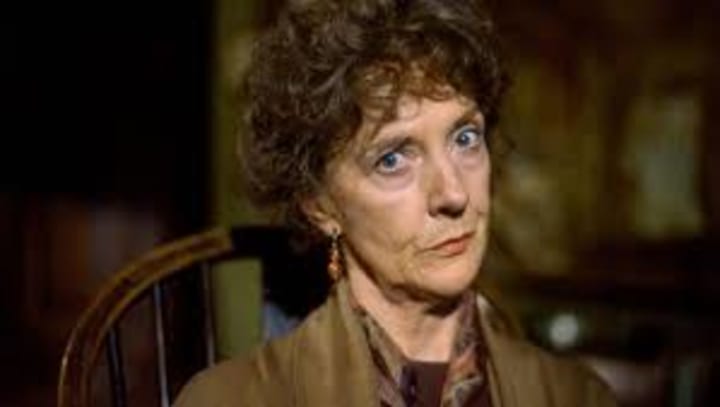
Plot: An avaricious antiques dealer tries to obtain the possessions of a dying client but overlooks a much greater prize.
“The Hand of God” has one major problem – it is narrator Celia is probably the least likeable protagonist in the entire collection. This is entirely intentional, but it can create something of a distancing effect. In contrast to the heavy and sometimes tragic tones of the other stories, “The Hand of God” is the quintessential “black comedy”, with an unpleasant character suffering a big humiliation. Played by Eileen Atkins (whose boy physique and formal manner make her a perfect fit for the role), Celia is the sort of character who THINKS she knows everything about her world, only to make one fatal mistake. Bar a few passing references to a deceased husband, the venomous Celia keeps the focus on the glamour of the antiques around her, and the potential fortune they can bring. The second series of Talking Heads is far darker than the first, and whilst “The Hand of God” is tame by black comedy standards, its meaner tone provides an effective statement of intent.
"Playing Sandwiches "(Starring David Haig as Wilfred)
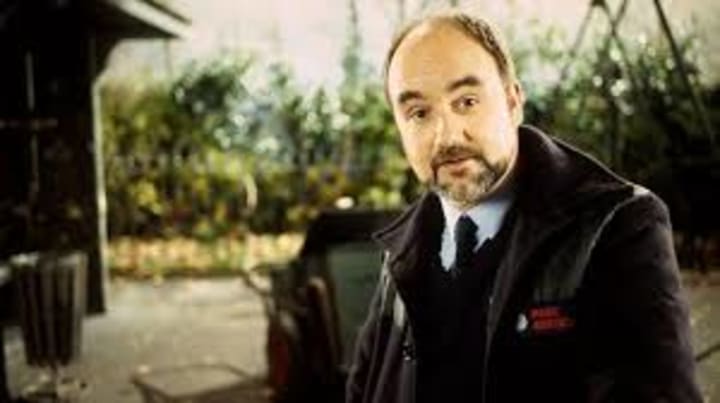
Plot: A park worker has an unhealthy obsession with the children there, and when dark secrets from his past resurface, it leads to a horrific crime.
It is impossible to discuss this episode without talking about the twist at the halfway point, as the story moves towards incredibly dark territory which is a total contrast to Bennett’s stereotypically “cosy” world. Even without this, “Playing Sandwiches” is the most unusual of the 12 monologues. The seedy realities of life as a park cleaner are discussed, with vandals, drunks and the occasional dead body providing a counter to the traditional view of parks as pleasant and relaxing places. Whilst most characters in Talking Heads are middle class (or at least aspiring towards a middle-class lifestyle) Wilfred is unambiguously working-class, and David Haig brings a sort of northern charm to the role. However, when Wilfred mentions how talking to a local child led to another visit to the sweet shop, the tone changes and becomes far darker.
Seen in this light, Wilfred's habit of buying Liquorice Allsorts and his frequent complaints over things which he sees as dangerous for children take on an uncomfortable new meaning. Despite the gravity of his crimes, we can empathize with Wilfred and invest in his plight. Like the best tragedies, there is a sort of inexorable pull, as Wilfred slides further and further towards his darkest desires. The final moments of “Playing Sandwiches”, where Wilfred reflects on his twisted fetish whilst languishing in jail, showcase a genuinely raw emotional pain. Bennet’s ability to draw us into Wilfred’s world and even make us feel sorry for him, is the mark of a true master.
"The Outside Dog" (Starring Julie Walters as Marjory)
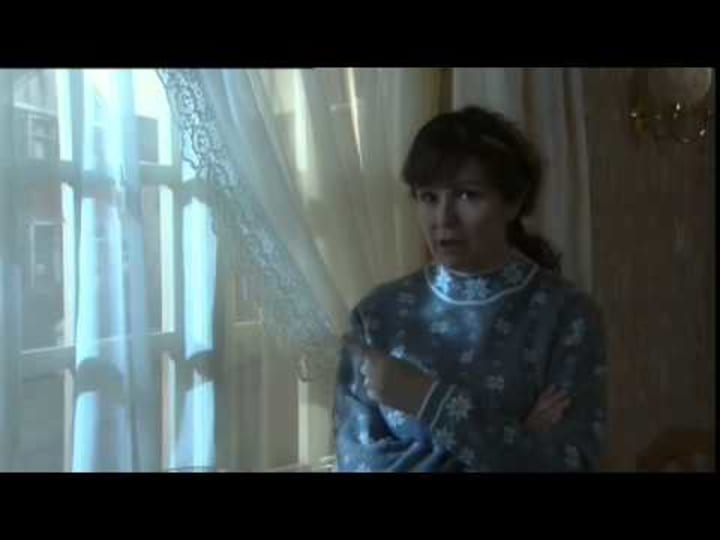
Plot: A cleanliness-obsessed woman finds her life turned upside down when her husband is accused of murder, and their overbearing dog becomes key to the case.
The contrast between this monologue and Julie Walters’ previous one (“Her Big Chance”) is the contrast between night and day. Every bit as dark as “Playing Sandwiches”, “The Outside Dog” is themed around the disturbing premise that you could be sharing your house with a serial killer. Marjory goes from confusion about the strange habits of her husband Stuart (who keeps going out late at night and discarding his clothes) to obliviously ignoring the murders in the local area, to blindly defending Stuart, to a horrified acceptance which comes far too late. This emotional rollercoaster is handled faultlessly, and really highlights how Walters grew as an actress between the two series.
The media hysteria surrounding Stuart’s arrest and trial is depicted effectively, and the bungling of the police investigations provides a welcome note of comic relief. However, the core of the story is another twisted take on the love triangle, as Marjory finds herself upstaged by Stuart’s dog Tina. It is really hard to see why the aggressive Stuart would be worth sticking with, but Marjory believes she can “civilize” her husband. Unfortunately, Tina, who represents Stuart’s savage side, ends up becoming the most important figure in his life. Making a dog we never see feel sinister and frightening is quite an impressive achievement, and the increasingly dark lighting adds to the oppressive feel. With Stuart and Tina kept at a total distance from us, they become the most villainous characters in the world of Talking Heads, ensuring that “The Outside Dog” is the nearest we get to full-on horror. However, seeing the story entirely from Marjory’s perspective gives it an emotional impact that really enhances the crushing bleakness of the ending. Whoever thought we would be so disturbed by the battle between a woman and a dog?
"Nights in the Gardens of Spain" (Starring Penelope Wilton as Rosemary)
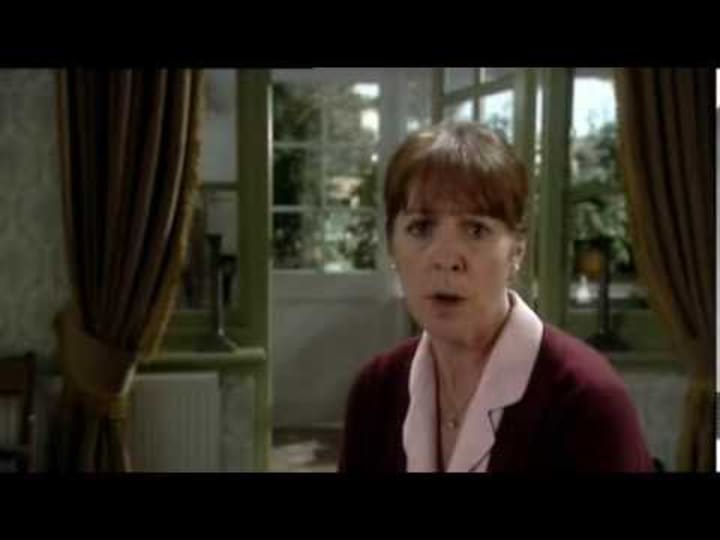
Plot: A gardening obsessed woman forms a close friendship with a neighbor who murdered her abusive husband.
This story has several similarities to “The Outside Dog”. Both deal with murder and the tabloid sensationalism which surrounds it. Both feature protagonists trying to order the world around them (Marjory through cleaning, Rosemary through gardening) as an escape from a loveless marriage. However, “Nights in the Garden of Spain” adopts a more humane and compassionate approach. Rosemary’s relationship with Fran McCorquodale is genuinely affecting, as she accompanies McCorqudale on several day release trips and marvels at the remarkable garden she has created within the prison walls. Penelope Wilton’s posh, polite manner has always been easy to make fun of, but she is still an effective narrator, with her initial bemusement turning to melancholy resignation at her own situation, with the occasional flash of anger.
Rosemary’s connection with McCorquodale is contrasted with her unhealthy relationship with her husband. When Rosemary finds out how Henry enabled the horrific abuse carried out by McCorquodale’s husband, it highlights the link between the stifling banality of married life and the focus on control and submission which motivates sexual predators and abusers. The sexual sadism club in a quiet northern suburb seems incredibly lurid for a Bennett story, but still feels uncomfortably plausible, with S&M culture more prominent than ever, and the “rough sex” argument used by the prosecution in Fran McCorquodale’s trial only recently outlawed. At the same time, the world of handcuffs, blindfolds and dog leashes provides some rather unsubtle symbolism. This becomes a greater problem later on, as we get scenes of Rosemary caressing a tomato given by Mrs. McCorquodale, and an end where she sits in a patio with barred windows – the metaphors in these images are a distraction as the dialogue conveys the themes and messages of the tale far more effectively. Although “Nights in the Gardens of Spain” has some major flaws, it is still a powerful, quietly feminist, story about how marriage can crush a woman’s’ spirit.
"Waiting for the Telegram" (Starring Thora Hird as Violet)
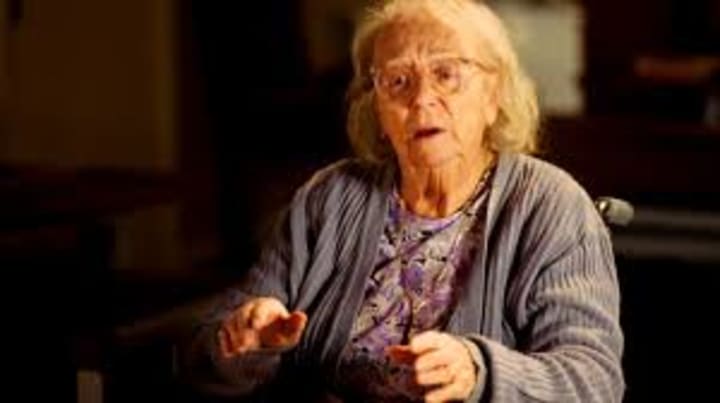
Plot: A 95-year-old woman in a retirement home discusses her life and her relationship with her gay carer.
In “A Cream Cracker Under the Settee”, Thora Hird’s character Doris claimed she would rather die than move to a retirement home full of “daft” old ladies who “all smell of pee”, and “Waiting for the Telegram” demonstrates why her fear of these places was justified. In her second monologue, Hird plays a woman who has spent years in a retirement home. With her memory fading and her body no longer working properly, Violet knows her days are numbered, but many of the carers are retirees believe that she can make it to 100. However, Violet sees no difference between the telegrams that mark this milestone and the telegrams that announced the death of her first love Edward in World War One. The tone is overwhelmingly solemn, but there are some moments of mild culture-clash comedy when Violet talks about her relationship with the younger, more modern carers. The only true friend Violet has is the supportive male nurse Francis, but he starts going to mysterious check-ups, and his health rapidly fades away…
The subplot about Francis is an interesting but problematic one. Bennett himself came out in 2004, and there is no doubt that his portrayal of Francis is sympathetic and affectionate. However, portraying a handsome gay man (Violet refers to him as a “fine strapping lad” who “has some grand arms”) brought down by AIDS is the sort of “gay tragedy” narrative which feels somewhat questionable in 2020. Bennett himself observed that the use of AIDS in the story was something of a plot device to enable a tidy but dramatic death in the background, but this can feel dehumanizing. It is worth contrasting Violet’s relationship with Francis with the doomed friendship between Rosemary and Ms. McCorquodale in “Nights in the Gardens of Spain” – their bond had strong lesbian undertones, but these were handled with far more subtlety. In “Waiting for the Telegram”, the inability to make Francis a fully formed character is a weakness, and he feels like a plot device. However, Violet’s reactions are still powerful, as the AIDS crisis symbolizes the way the harsh realities of modern life can still disrupt her world. “Waiting for the Telegram” may not have the same impact as “A Cream Cracker Under the Settee”, but it represents another effective monologue from Hird, providing insight into one of the last inhabitants of a fading world.
Conclusion
The Talking Heads monologues deserve their reputation as one of the finest collections of television plays ever created. The acting is top-notch throughout, with effective direction, designs and music enhancing the overall experience. However, the monologues themselves are the stars of the show, providing memorable characters, featuring both disturbing glimpses into the darker side of human nature and poignant but warm commentaries on an old-fashioned world gradually fading into obscurity. The first series is superior overall, but the second series contains strong episodes as well, and all the monologues are effective. Overall, Talking Heads is one of Alan Bennett’s strongest works, and the new remake will represent an excellent introduction for a new generation.





Comments
There are no comments for this story
Be the first to respond and start the conversation.